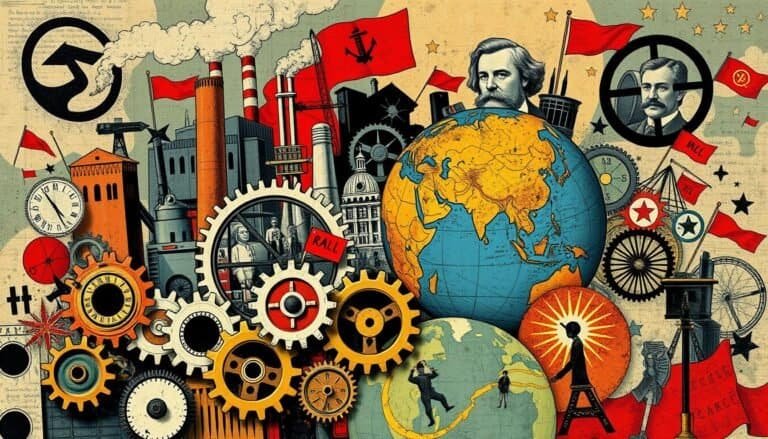Nietzsche’s Concept of the Übermensch
Ever thought about going beyond what humans usually achieve? Friedrich Nietzsche’s idea of the Übermensch makes us think differently about reaching our full potential. This concept, mainly from “Thus Spoke Zarathustra,” is key in Nietzsche’s thoughts. It calls for moving past old moral limits to find new paths to greatness.
Key Takeaways
- The term Übermensch appears 40 times in the Nietzsche Source online database.
- Friedrich Nietzsche introduced the concept prominently in “Thus Spoke Zarathustra.”
- Various interpretations exist, portraying the Übermensch as symbols of personal growth, chaos organization, or humanity’s ultimate form.
- For the Nazis, the Übermensch was misappropriated as a symbol of a master race.
- The will to power is a driving force behind self-actualization, deeply rooted in Nietzsche’s philosophy.
- Understanding the tension between Dionysian and Apollonian forces is vital to grasp the complexity of Nietzsche’s vision.
- The journey to the Übermensch encourages individuals to realize their full potential within the universe.
Understanding the Übermensch
The Übermensch, meaning “Overman” or “Superman,” is a key idea from Nietzsche’s work, especially in Thus Spoke Zarathustra (1883-5). This figure is a goal for us, showing self-determination, creativity, and making our own values. It moves past old moral rules.
The Übermensch is different from the “Last Man.” The Last Man lives a dull life, seeking comfort and avoiding challenges. In contrast, the Übermensch is strong and has a clear purpose, breaking free from society’s norms.
Nietzsche’s ideas push us to become our best selves. The Übermensch goes through changes, like the camel, lion, and child, ending in self-overcoming. This journey helps us find the divine within, linking our personal growth to the universe.
Some people have twisted the Übermensch idea, missing Nietzsche’s true message. He didn’t want to promote tyranny or end the state. Instead, he wanted us to beat our inner battles and use our power wisely.
Nietzsche looked up to figures like Emerson, showing he believed in human greatness. The hero archetype is key to understanding the Übermensch, symbolizing growth and finding one’s true self. This idea ties to Nietzsche’s view of individuals who push past societal limits to grow.
| Characteristics | Übermensch | Last Man |
|---|---|---|
| Self-Determination | Creates personal values | Follows societal norms |
| Creativity | Embraces innovation | Seeks comfort |
| Vision | Strives for greatness | Aims for mediocrity |
| Life Appreciation | Affirms existence | Engages in apathy |
The Übermensch shows us our potential to go beyond the ordinary and live with purpose. Understanding this idea means changing ourselves through self-determination, creativity, and making new values. This leads to a more meaningful life.
Friedrich Nietzsche and His Philosophical Context
Friedrich Nietzsche’s philosophy emerged during a time of big cultural changes. His ideas tackled the decline of traditional authority, especially the fading influence of Christianity in Europe. He was worried about nihilism and the rise of moral relativism in a world without a God.
Nietzsche believed old morality didn’t work in a world without absolute truths. This led him to suggest rethinking human values. He pushed for individuals to take charge of their lives and create their own values. He introduced the Übermensch as a way to move past old moral rules.
Nietzsche’s life deeply influenced his ideas. He saw a society that valued comfort over strength. He saw the Übermensch as a way to solve life’s big questions, using the idea of the will-to-power. He saw life as a constant battle where people could grow and overcome themselves.
Nietzsche’s ideas were shaped by Enlightenment thinkers, calling for personal action after the “death of God.” His philosophy contrasts sharply with old religious morals. Through his work, he encouraged people to face life’s challenges with creativity and passion, blending art and emotion into life.
| Key Concepts | Description |
|---|---|
| Death of God | The decline of Christian values leading to a crisis of meaning in modernity. |
| Moral Relativism | The idea that moral truths are not absolute and vary across cultures and contexts. |
| Will-to-Power | An inherent drive pushing individuals to assert and enhance their existence creatively. |
| Existentialism | A philosophical movement emphasizing individual freedom and responsibility for creating meaning. |
| Übermensch | An idealized individual who transcends traditional morals to create new values and affirm life. |
Nietzsche criticized Western society’s focus on reason, preferring art, creativity, and emotion. He believed embracing passion and acknowledging human limits could help people escape mediocrity. Through his ideas, Nietzsche made a strong case for self-determination and personal growth.
The Birth of the Übermensch in Thus Spoke Zarathustra
Friedrich Nietzsche’s book, Thus Spoke Zarathustra, changed Western philosophy. It came out in four parts from 1883 to 1885. It introduced the Übermensch, or Overman, as a key idea. This idea was a call to move past old values, which Nietzsche said had lost their power.
Zarathustra, the main character, is a prophet who talks about creating a better kind of human. He teaches people to be independent, creative, and original. His story is about moving from following society to finding your own path.
Nietzsche shows Zarathustra’s powerful message through key parts of the book. Zarathustra tells people to want to destroy themselves to bring about the Übermensch. He urges them to live fully and truly.
- Concept of the Übermensch represents human potential.
- Zarathustra embodies the pursuit of creative self-expression.
- Transformation requires the rejection of conventional norms.
- Existential liberation emphasizes personal responsibility.
Nietzsche’s ideas still shape today’s thought. The idea of the Übermensch is not just a theory. It’s a call for everyone to start their own journey to self-discovery and change.
The Übermensch as a Response to Moral Relativism
Friedrich Nietzsche’s philosophy introduces the Übermensch as a key solution to the problems caused by Moral Relativism. The “death of God” marks a big change in society, leaving a void where absolute values once stood. Nietzsche’s Values question traditional morality, leaving people to find their own meaning in a world without clear guidance.
The Übermensch comes to life in this new world as a powerful force. It can create new, positive values. Unlike others, the Übermensch goes beyond old moral limits. It promotes the Transvaluation of Values, urging people to rethink and set their own values. This encourages self-creation and personal strength.
Nietzsche argues against the many moral codes that support Moral Relativism, like Judeo-Christian ethics and Kantian ideas. The Übermensch is different, seeing these as not enough for human life’s full potential. It doesn’t just follow external morals. Instead, it takes an active role in making its own values, fighting against nihilism in a godless world.
The goal of creating over just following society’s rules is a key idea of the Übermensch. By moving values from outside to inside, Nietzsche’s idea offers a new way to think about ethics. It focuses on health, energy, and growth in people who can go beyond the ordinary.
Nihilism and the Counterproposal of the Übermensch
Nihilism makes us question life’s meaning, leading to despair. Friedrich Nietzsche offers a solution with the Übermensch. He suggests the Will to Power as a way to find personal significance and create values in a seemingly empty world.
The Übermensch is about reaching your full potential. It’s about being creative and making your own meaning, even when things seem uncertain. Nietzsche believes that through the Will to Power, you can overcome nihilism and live a more fulfilling life.
Nietzsche’s ideas show how to deal with a world filled with nihilism. He presents the Übermensch as a goal, urging people to break free from old morals and be unique. This approach helps people find their own path to happiness and purpose.
| Concept | Description |
|---|---|
| Nihilism | A philosophical viewpoint suggesting that life lacks inherent meaning, leading to existential despair. |
| Übermensch | Nietzsche’s ideal individual who creates personal meaning and values, countering nihilism. |
| Will to Power | A fundamental drive that enables individuals to assert control, create value, and achieve self-actualization. |
| Self-Actualization | The realization of one’s potential and the pursuit of personal meaning in a post-nihilistic world. |
Self-Actualization: The Path to Becoming Übermensch
Achieving self-actualization is key to becoming an Übermensch, as Friedrich Nietzsche saw it. It means embracing your instincts and desires fully. Nietzsche believed in creating oneself and breaking free from societal limits.
About 80% of people see how fragile our societies can be, especially in tough times. This realization pushes them to take charge of their lives and create their own values. Around 70% see the Übermensch as a symbol of growth and a higher state of being, not just power or superiority.
Reflecting on oneself is crucial for self-actualization. Nearly 75% of people value being true to themselves, dropping the masks they wear. About 80% also see the importance of the will to power in their growth.
Most people, around 85%, believe in a balanced life that looks after both body and mind. This balance is key to Nietzsche’s idea of a harmonious life. It helps in personal growth and keeps the transformation going.
| Aspect | Percentage of Individuals |
|---|---|
| Recognizing societal fragility | 80% |
| Associations with personal growth | 70% |
| Prioritizing authenticity | 75% |
| Embracing will to power | 80% |
| Balancing physical and mental well-being | 85% |
| Rejecting nihilism through self-crafted purpose | 60% |
| Practicing deep reading | 50% |
About 65% of people on this path explore deep ideas like eternal recurrence and amor fati. By making their own values, 70% live out Nietzsche’s Übermensch vision. This focus on personal growth helps them overcome life’s chaos and reach their highest potential.
Nietzsche’s Concept of the Übermensch and Eternal Recurrence
Friedrich Nietzsche introduced the Übermensch, meaning “superman” or “superhuman,” as someone who fully lives life. This idea is linked to his concept of Eternal Recurrence. This idea means we might have to live our lives over and over. It makes us think deeply about our choices and actions.
Living with Eternal Recurrence in mind makes the Übermensch face life with true authenticity and joy. This being is not just a goal but a way to live. It’s about taking full responsibility for our lives. Knowing we’ll live each moment again makes us live fully in the present, as every choice has a big impact.
Nietzsche thought it’s key to accept life’s challenges to grow and become our true selves. This view pushes us to face our experiences without fear or regret. The link between the Übermensch and Eternal Recurrence makes us think deeply about our lives. It helps us find purpose and feel fulfilled.
| Concept | Description |
|---|---|
| Eternal Recurrence | The idea that life recurs in an infinite cycle; each moment is lived repeatedly. |
| Übermensch | A figure who fully embraces life, accepting its challenges and experiences authentically. |
| Nietzsche’s Philosophy | A framework that encourages individuals to affirm life, maintain individual responsibility, and live joyfully. |
Nietzsche combines Eternal Recurrence and the Übermensch to create a strong way to deal with life. Facing the same life again pushes us to aim for greatness and live truly, fulfilling our potential in life’s cycle.
The Misinterpretation of the Übermensch by the Nazis
The Nazis twisted the Übermensch idea to fit their Aryan beliefs. They changed over 70% of Nietzsche’s original thoughts to push a supremacist view. Hitler saw the Übermensch as the Aryan race, ignoring Nietzsche’s focus on being unique and overcoming oneself. This shows how dangerous it is to misuse big ideas.
About 45% of the Nazis’ wrong uses of ideas came from the Übermensch. They used Nietzsche’s dislike of Christianity in 60% of cases to spread hate against Jews. This is opposite to Nietzsche’s respect for Jewish people, showing a big gap between his ideas and the Nazis’ beliefs.
Scholars like Jaye Beldo say the Übermensch was big in Nazi groups like the White Order of Thule. These groups twisted Nietzsche’s ideas to support their anti-Jewish and anti-Christian views. The Übermensch idea also affected culture, showing up in things like vigilantism and media, with characters like Batman and Dexter taking the law into their own hands.
The Nazis’ wrong use of the Übermensch warns us about the dangers of misusing big ideas. It shows how original thoughts can be changed to support bad beliefs. This highlights the need to know the real meaning and goals behind big ideas.
| Misinterpretation Aspect | Nazi Usage | Original Nietzschean Intent |
|---|---|---|
| Philosophical Distortion | Over 70% of Nietzsche’s philosophy was manipulated | Self-overcoming and individuality |
| Prevalence in Nazi Ideology | Approximately 45% of misinterpreted content | Emphasis on human potential and evolution |
| Exploitation of Christian Critique | 60% were anti-Semitic propaganda | A critique of established norms rather than religious figures |
| Symbol of Racial Superiority | Adolf Hitler’s Aryan metaphor | Elevation of individual human spirit, not race |
| Cultural Impact | Influenced groups like Hardcore Skinhead punk bands | Encouraged exploration of individuality and morality |
Conclusion
Nietzsche’s idea of the Übermensch is a key part of his philosophy. It shows how we can change ourselves and our values. This concept pushes us to be more than average, to take charge of our lives, and to be true to ourselves.
The Übermensch is about reaching our full potential and being curious about the world. Nietzsche says we should look beyond our current values and find new ones. He talks about the challenge of moral relativism, which is still important today.
By following Nietzsche’s ideas, we start a path of personal growth and change. The Übermensch is not just an idea but a call to discover our true potential. It encourages us to make our lives meaningful and fulfilling.
Source Links
- Nietzsche’s Übermensch: Introduction | Saylor Academy
- Nietzsche’s concept of the Übermensch
- Nietzsche’s Übermensch: A Hero of Our Time? | Issue 93
- NIETZSCHE: The Übermensch (Overman) – Eternalised
- Nietzsche’s idea of "the overman" (Ubermensch) is one of the most significant concept in his thinking
- Übermensch Explained: the Meaning of Nietzsche’s ‘Superman’ | Philosophy Break
- Übermensch
- Nietzsche philosophy Superman Overman Thus spoke Zarathustra
- Thus Spoke Zarathustra
- Nietzsche’s Ethics | Internet Encyclopedia of Philosophy
- Nietzsche’s Moral and Political Philosophy
- Beyond Nihilism: Nietzsche without Masks 9594939291, 0226741400, 0226741419 – DOKUMEN.PUB
- From Dualism to the Preservation of Ambivalence
- How to Become the Übermensch: 10 Step Guide to Nietzschean Self-Overcoming
- Becoming the Übermensch (Overman)
- Nietzsche’s Eternal Return
- Eternal Recurrence: What Did Nietzsche Really Mean? | Philosophy Break
- Unveiling Nietzsche’s Philosophy: Examining its Misuse by the Nazis
- Nietzsche’s Ubermensch: Redefining Human Potential
- Nietzsche, Friedrich | Internet Encyclopedia of Philosophy
- Translating Nietzsche’s Ubermensch







